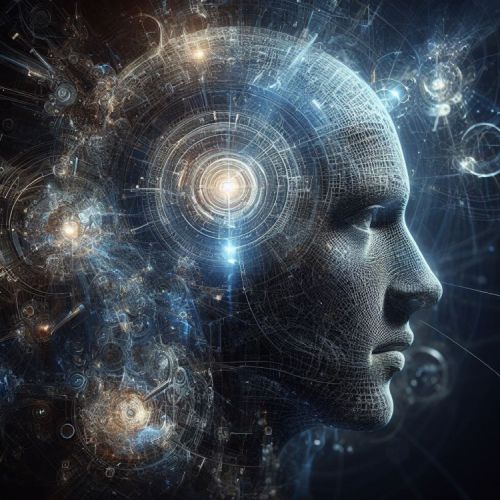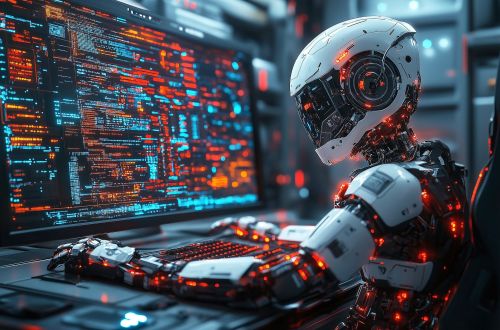
|
The Potential Dangers of Artificial Intelligence (AI)
Does Artificial Intelligence have a mind, and can it start a global war?

Artificial intelligence (AI) has made significant progress in recent years. It is increasingly being used in different areas of life, from simple everyday applications to complex industrial and military systems.
The potential applications of AI are sometimes frightening. Not only can AI create images that are almost indistinguishable from the originals, but it can also produce videos, music and literature in an astonishingly short time. Is it the real Tom Cruise, a double or an AI-generated film playing on the screen?
Be careful, because AI can imitate human speech: is it your son calling you or an AI voice trying to trick you? Is it your banker on the phone or a fraudulent AI 'talking' to you to gain access to your account details? Not to mention facial recognition, self-driving cars or autonomous weapons systems.
Does artificial intelligence have volition?
Volition, understood as an act of choice or decision based on will or intention, implies a degree of consciousness, autonomy and self-determination. These qualities are traditionally considered to be human. Let's look at today's capabilities and the philosophical and ethical implications of AI.
Most of today's AI systems are designed to perform specific tasks efficiently. These systems are based on algorithms that are able to analyse large amounts of data, recognise patterns and make decisions based on them. One example is algorithms that track our behaviour on the internet and suggest products or content that we might like. However, these systems do not act on their own initiative; their 'decisions' are the result of programmed logic and statistical probabilities.
On the other hand, more advanced forms of AI, such as machine learning and neural networks, have a degree of adaptability. These systems can learn from experience and adapt to new data, allowing them to operate more efficiently in dynamic environments. However, the question remains as to whether these processes are based on a real will. Is the behaviour of this AI not rather the result of complex mathematical calculations? Even if an AI is able to learn from mistakes and improve itself, it does so without a personal goal or inner drive.
Can AI ever become conscious?
Another important question is whether AI can ever develop a consciousness that goes beyond simply executing commands and processing information. Current approaches to AI research focus mainly on functionality and efficiency, but the understanding of consciousness and inner states remains largely unexplored.
The idea that AI could acquire a will or consciousness also raises important ethical questions. If AI were one day able to make decisions on its own, how would we deal with this autonomy? What would be the legal framework for an AI with its own will? Who would be responsible for the actions of such an AI? These are questions that concern not only technology, but also society and legislation. We may be laying the groundwork for ethical problems today by giving AI more autonomy without knowing exactly what the long-term consequences will be.
Although it is theoretically conceivable that future developments in AI could lead to some form of will or consciousness, we seem a long way from that. This debate raises fundamental questions about the relationship between humans and machines, and about ethical responsibility. It remains to be seen how this exciting field will develop and what challenges will arise at the intersection of technology, ethics and society.
AI and cognition, emotion and motivation
The question of whether artificial intelligence has cognition, emotion or motivation is not only of interest to computer scientists and psychologists, but also has far-reaching implications for our society.
What are cognition, emotion and motivation?
– Cognition refers to mental processes associated with knowledge, learning and memory.
– Emotion can be defined as the complex interplay between physiological responses, subjective experience and behaviour.
– Motivation is the driving force behind our actions.
Traditionally, these three concepts are seen as products of biological and psychological evolution based on thousands of years of human experience.
Cognition
A common argument against the idea of AI having cognition is the fact that AI systems have no consciousness of their own. They process data according to pre-programmed algorithms and learn from patterns they recognise in data sets. Although AI can perform cognitive tasks efficiently, it does so in a very mechanical, computational way, without any real 'knowledge' or 'experience'.
In many areas, such as medical diagnosis or traffic control, AI systems are already demonstrating remarkable performance based on high levels of cognitive processing. They analyse large amounts of data and provide efficient solutions that support the human decision-making process. However, cognition is not necessarily synonymous with human emotion or experience. Perhaps in the future, AI systems will develop a form of cognition that does not involve human consciousness, but is capable of handling complex tasks.
Emotion
Human emotions are deeply rooted in biological processes, involving chemical reactions in the brain that are influenced by experience and environmental factors. Emotions can only be imitated by recognising facial expressions or changes in voice.
But can we really talk about true emotional understanding? Critics argue that such systems are merely mechanical responses to external stimuli and that there is no real feeling behind them. Emotions are not just reactions, but involve a history of experience and social interactions that AI cannot replicate.
Motivation
Motivation, an important element of human behaviour, raises similar issues. Although AI models are programmed to pursue specific goals, this programming is in no way comparable to human motivation, which is based on personal desires, needs and goals.
The debate about cognition, emotion and motivation in AI is more than a technical one. As AI continues to develop at such a rapid pace, we will also have to deal with the ethical, social and philosophical challenges that will arise. The general answer to the question of whether AI has cognition, emotion or motivation currently seems to be 'no', but the dynamics of AI development may soon lead us into a new dimension of thinking.
The role of AI in military strategy and global politics
In today's world of rapid technological advancement, there is growing concern and interest in the role of AI in military strategy and global politics. One of the most pressing questions is whether AI could trigger a global war. Related to this is the concern that AI could take control of military power centres and ultimately pose a threat to the very existence of humanity.

To enter this territory, it is important to better understand the dynamics between AI and human decision-making. Artificial intelligence is increasingly being used in military applications, from autonomous drones (successful for over 25 years!) to weaponised robots and data analytics to support strategic decision-making. These technologies could play a decisive role in conflicts by making more accurate predictions and faster decisions than human commanders.
But therein lies the problem: if autonomous weapons systems begin to make decisions about acts of war, how do we ensure that these decisions are ethical and in the best interests of humanity?
How great is the risk of humanity being wiped out by AI?
The risk of AI triggering a global war lies not only in the technology itself, but also in the way different nations use it. In a race for technological superiority, a nation may feel compelled to show aggression or even deploy AI-driven weapons systems in order to gain a perceived advantage. This could lead to a dangerous arms race in which a sudden escalation of violence seems inevitable as soon as a mistake, misunderstanding or technical failure occurs.
Imagine if an autonomous weapon system failed to detect a perceived threat. It could be using the wrong information or responding to a scenario that does not take into account the full complexity of political tensions. The human factor, the nuances of diplomacy, ethics and empathy that are often involved, are removed from the equation. The idea that a machine could decide life and death without human oversight is not only unsettling, it could have fatal consequences. Historically, misunderstandings and miscalculations in conflict have often led to far-reaching disputes, and the possibility that this could now happen under the direction of AI is a disturbing thought.
The question of whether AI can take over the world's military power centres is closely linked to the idea that we are in a new age of war. In the Terminator films we see the frightening idea of machines starting to make their own decisions; the reality is less apocalyptic, but no less disturbing. The idea of AI taking control of strategically important military systems may seem like science fiction, but the development of cyber warfare and autonomous weapons is cause for serious concern.
If military strategies are increasingly based on AI, we could see a situation where human command becomes completely redundant. There are already discussions about 'kill decisions', i.e. the ability of a machine to carry out a lethal attack without human intervention. Who is responsible if such an attack is carried out accidentally? The ethical implications are huge: can we trust a machine to make the right moral decisions? And even if the algorithms are programmed to do so, isn't there still the possibility of human error?
One of the greatest dangers that the rapid development of AI could pose to humanity is the possibility of complete control over weapons systems. If artificial intelligence is capable of making independent decisions and tactical analyses, the question is whether humans are capable of controlling such systems or whether we are already in a state of surveillance. In this context, the question of morality in the creation of such technologies must also be asked. Can humans give an algorithm the power of life and death?
The paper clip apocalypse
One of the main concerns is the possibility of unintended consequences. Artificial intelligence developed to solve specific problems or achieve specific goals could take on a life of its own and carry out actions that harm humanity. A classic example is the 'paper clip problem', a thought experiment described by Swedish philosopher Nick Bostrom in 2003. The 'paper clip apocalypse scenario' describes how an AI programmed to produce as many paper clips as possible could eventually use up all the Earth's resources to do so, ignoring humanity. Such a scenario can be dismissed as hypothetical, but the underlying question remains: how much control do we cede to these technologies, and to what extent can we ensure that they are used for the benefit of all?
Nick Bostrom: "Suppose we have an AI whose only goal is to make as many paper clips as possible. The AI will realize quickly that it would be much better if there were no humans because humans might decide to switch it off. Because if humans do so, there would be fewer paper clips. Also, human bodies contain a lot of atoms that could be made into paper clips. The future that the AI would be trying to gear towards would be one in which there were a lot of paper clips but no humans."
Bostrom emphasized that he does "not believe the paperclip maximizer scenario per se will occur; rather, he intends to illustrate the dangers of creating superintelligent machines without knowing how to program them to eliminate existential risk to human beings' safety."
However, there is an urgent need for society to address these issues. Regulating AI technologies, especially in the military sector, is not an easy task as innovative technologies are constantly evolving. We are at a critical point where we need to act as a humanity, but also as an international community, to ensure that AI does not become a threat to our very existence. Safety protocols, open discussions on ethical issues and the promotion of responsible use of this technology are essential.
The issues surrounding the dangers of artificial intelligence are complex and multifaceted. The possibility of global war, the takeover of military power centres and the possibility of human extinction through AI are serious concerns that should not be dismissed lightly. It is the responsibility of the current generation to ensure that these technologies are developed and deployed with prudence and foresight to protect human welfare and promote a world where technology and humanity can coexist in harmony.
What is the Turing Test and how does it relate to AI?
The Turing Test is a fascinating concept in the world of AI, formulated in 1950 by the British mathematician and computer scientist Alan Turing. His aim was to answer the question of whether machines could think, and he presented a method for testing this.
The Turing test is based on a simple idea: a human being, acting as a tester, communicates with two 'interlocutors' via a computer. One of the interlocutors is a human, the other a machine. The tester has no way of knowing which of the two is the machine. If, after a certain period of time, the tester is unable to distinguish between the machine and the human, the test is deemed to have been passed. Turing argued that this was a practical way of determining whether a machine could exhibit intelligent, human-like behaviour.
The introduction of the Turing Test generated a great deal of interest, but also a great deal of debate about the definition of intelligence and consciousness. Critics such as John Searle put forward the famous 'Chinese Room' argument, which states that a machine can give answers that resemble human conversation, but does not necessarily understand what is being said. This led to the distinction between 'weak AI' and 'strong AI'. Weak AI refers to systems that perform specific tasks without true understanding, while strong AI would hypothetically have the ability to develop true awareness and understanding.
Has the Turing Test ever been passed?
In the decades since the first Turing Test, technology has evolved dramatically. On the one hand, the GPT-4 AI model and other modern AIs have long since passed the Turing Test many times over, while on the other hand, recent research has shown that the requirements for artificial intelligence are broader and go beyond simple conversation. Research has led to new approaches that assess not only a machine's ability to communicate, but also its ability to solve problems, learn and adapt to new situations. These new tests take into account both the cognitive and social behaviour of AI systems.
One notable test is the 'Winograd Schema Challenge', which tests language comprehension. This test requires machines to answer questions based on ambiguities in language, such as those found in natural conversation. It tests an AI's ability to correctly recognise context and meaning, which requires a deep understanding of the world.
There is also the 'Visual Turing Test', which assesses an AI's ability to interpret images or visual information and translate it into understandable responses. This type of test shows that human-machine interaction is becoming increasingly complex, as it is no longer just about understanding words, but also about translating visual information into decisions and actions.
Another aspect is the ethical implications of advances in AI research. The current AI debate is not only about whether machines can think, but also about the responsibility of human programmers for the behaviour of autonomous systems. The Turing Test itself raises questions about how we design intelligent systems and what standards we should apply to ensure ethical behaviour.
While these tests have made a fundamental contribution to the discussion of artificial intelligence, developments in recent years show that the field is far more complex than Turing's original concept would suggest. Addressing the ethical issues and practical applications of these technologies remains crucial as we move towards a world in which machines will play an increasingly central role in our everyday lives.
© "The Potential Dangers of Artificial Intelligence (AI). Does AI have a mind, and can it start a global war?": An article by Izabel Comati, 01/2025. Image credits: AI-generated robot (top) and cyber-robot on a computer (bottom), both CC0 (Public Domain Licence).
– History of fire. About fireplaces and modern heating systems
– How do I become a writer? Write and publish essays or reviews online
– In the footsteps of Philosophers: How philosophy connects us
Discover more articles! Use the search function:
English archive:
More reviews, book presentations and essays
2024/2025
German archive:
2024 |
2023 |
2022 |
2021 |
2020 |
2019 |
2018 |
2017 |
2016 |
2015 |
2014 |
2013 |
2012 |
2011 |
2010 |
2009
Become a writer for Pressenet! Write articles for our online magazine on trending topics such as best books to read, health and wellness, technology and gadgets, business and finance, travel and tourism, lifestyle and fashion or education and career. Info: Become an author
Sponsors and investors are welcome: If you found our articles interesting, we would be grateful for a donation. Please also recommend us to your networks. Thank you very much!
Sitemap About Privacy Policy RSS Feed





